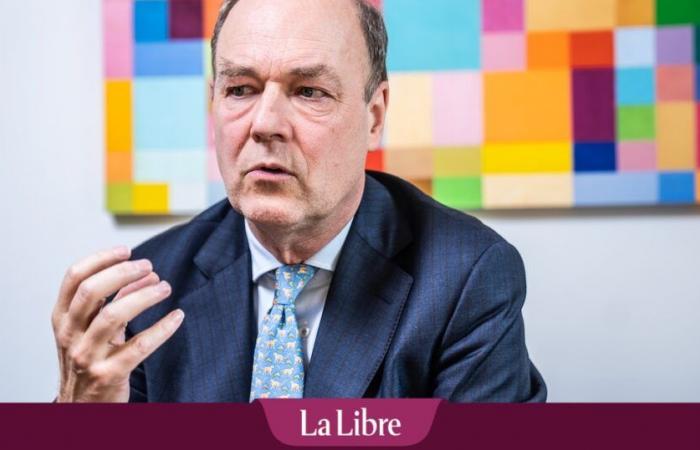
Is the European Union (EU) in better or worse shape than it was when you took office?
I am quite convinced that it is in a better state, but that does not mean that everything is under control and that we can be reassured for the future because the world has also changed enormously in recent years. My mandate (beginning of 2020 – end of 2024, Editor’s note) has really been shaped by crises. We have been through some very difficult times, but the EU has managed to pull itself together. We have learned a lot from the Covid crisis, as we had already learned a lot of lessons from the (first, Editor’s note) Trump presidency. Then came the war in Ukraine, the energy crisis… The EU’s strategic autonomy project accelerated. Everything is not ready but there is a greater awareness of our vulnerability, but also of the recipes to follow to remedy it. The reports of (former Italian Prime Minister) Letta (on the domestic market, Editor’s note), by (former European Central Bank President) Draghi (on competitiveness, Editor’s note) and (former Finnish President) Niinistö (on crisis preparedness) materialize this evolution of minds that we must implement more things. We have already strengthened our toolbox in recent years, but the work is never finished.
gullThe Union’s strategic autonomy project has accelerated. There is a greater awareness of our vulnerability and the recipes to follow to remedy it.
The Letta, Draghi and Niinistö reports raise worrying findings about the Union’s failings. Mario Draghi warned of the risk of slow death in the European Union and called for very ambitious decisions to be taken quickly. But do Europeans have the political capacity, when we see the situation in France, Germany, Italy, the Netherlands, Hungary?
Mr. Draghi’s observations are still widely shared, and that is very good. With his report, he put his finger on the wound, and with his frankness, he opened the eyes of many people. Even if there is a great urgency to implement all of this, we should not decide everything in two weeks. What we need to do is prepare the ground, notably at the informal European Council in Budapest (held on November 8, Editor’s note). President von der Leyen has made it very clear that she will include key elements of these reports in the commissioners’ mission letters and in the Commission programme. The more formal decision-making process will then begin. But it’s true that it’s incredibly difficult. Now there is a path that is mapped out. We must have taken important first steps by 2025-1926.
The European Union must act quickly and strongly, otherwise it will collapse, warns Mario Draghi. Is she capable of it?
The discussion on the next multiannual Union budget will begin next year. The main challenge will be to define what the Twenty-seven are ready to do together?
This question arises every time we negotiate a financial framework, but its relevance is increasing. With the war in Ukraine, the possible change of administration in the United States (the interview was conducted before the election of Donald Trump, Editor’s note)the assertiveness and economic dynamism of China but also of other emerging countries, the challenges are significantly greater than ten years ago. We are at a time of big choices. The Union is well equipped to face “everyday” crises but to take a step forward – for its positioning in the world, the prosperity of our citizens, our security, our well-being on the planet… -, current governance is not enough and neither are the financial means.
gullThe Union is well equipped to face “everyday” crises but to take a step forward – for its positioning in the world, the prosperity of our citizens, our security, our well-being on the planet… -, current governance is not enough and neither are the financial means.
We find in the governments of Member States, or in the European Parliament, nationalist and far-right personalities and parties who no longer talk about destroying the EU, but about fundamentally changing it. Is there a risk that fundamental and founding values will end up being denied?
We hear this speech more prominently than a few years ago, yes. But if it is difficult to change the European Union quickly, it is also very difficult to destroy it quickly. Power is very diffuse there. This is sometimes a weakness, but it also prevents a current which has the temporary advantage following elections from being able to radically or quickly change the nature of the Union. There is a certain inertia which, in my opinion, also protects us. I’m not too worried about a radical change in the European Union.
Isn’t this a danger that is underestimated, when we see the nuisance capacity of someone like Hungarian Prime Minister Orban? What will happen if tomorrow there are three or four like him in power in the EU?
The Hungarian presidency of the Council ends in two and a half months. Mr. Orban will not remain Prime Minister for another thirty years. I continue to believe – it is more an act of faith than a hard reality – that there are forces in the EU which continue to emerge to seek the right balance. There is a collective wisdom, not only in the heads of the twenty-seven heads of state and government, but also in those of opinion leaders, the press, intellectuals, citizens, entrepreneurs… It has given us brought from the aftermath of the Second World War to where we are today.
European Union: Viktor Orban gets a slap on the wrist from (almost) all member states, after his controversial visits to Moscow and Beijing
Europeans emphasize that the outcome of the conflict in Ukraine is for them an existential question. But are they doing enough to avoid the scenario of a Ukrainian defeat?
It is difficult to give a clear-cut answer on the definitive effect of the measures we take in a war such as we have not seen on our continent for generations. I still remain quite convinced that we are doing a lot, to the extent possible and our current means. However, I fear that we have not yet seen the end of the conflict. The front may stabilize but it is equally possible that things will degenerate and we will be forced to take firmer measures. Aid to Ukraine will continue. Support may not be as unanimous as it was at the start of the war, but it remains very strong. Public opinion also instinctively feels that something unfair is happening here and that potentially threatens the model of freedom that is ours.
gullEurope simply could not replace US aid to Ukraine if a US withdrawal took place
If Donald Trump were elected and decided to reduce American support for Ukraine, would the EU be able to compensate for a defection from the United States?
Let’s be honest: an American withdrawal of military assistance to Ukraine would be a very hard blow, first for Ukraine obviously but also for the EU. This simply cannot replace American aid. But it is also clear that this withdrawal – if it took place – would suddenly and quickly force us to take better control of our fate, and therefore also with regard to the defense of Ukraine.





